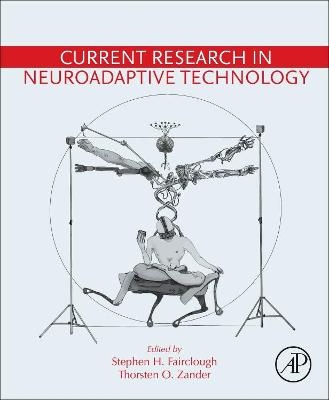
Current Research in Neuroadaptive Technology
Academic Press Inc (Verlag)
978-0-12-821413-8 (ISBN)
The topic of neuroadaptive technology is novel and contemporary and editors Dr. Stephen H. Fairclough and Dr. Thorsten O. Zander have captured issues related to this emerging technology at the point of inception. It is a key reference for biomedical engineers and researchers in neural engineering, biomedical engineering, computer science, and mathematics.
Stephen Fairclough obtained his undergraduate degree in Psychology from University of Central Lancashire in 1985. He received his PhD from Loughborough University in 2000 where he worked as a Research Fellow at Human Sciences and Advanced Technology (HUSAT) Research Centre. He currently is a Professor of Psychophysiology in the School of Psychology at Liverpool John Moores University (LJMU). He has been involved in applied psychophysiological and neuroscientific research for over twenty-five years. His main areas of methodological expertise cover EEG, fNIRS and cardiovascular in both laboratory and field settings. He is a director on the Executive of the Human Factors and Ergonomics Society (European Chapter) and a member of the editorial board for IEEETransactions of Affective Computing. He has co-edited two collections on physiological computing research and four journal special issues. He is currently one of the General Chairs for the Neuroadaptive Technology Conference and co-founder and co-leaderof the Society for Neuroadaptive Technology. Dr. Thorsten Zander took a degree in Mathematics at the Westfalische Wilhelms-Universitat, Munster, Germany, and his doctorate at the Institute of Human-Machine-Systems at Technical University Berlin, before embarking on a distinguished career at various research institutions, including Affiliated Research Scientist at the Institute for Knowledge at Technical University Graz, Austria, Project Leader at Max-Planck-Institute for Intelligent Systems, and ongoing habilitation process in the Department of Psychology and Ergonomics at Technical University Berlin. Dr. Zander is currently Chair for Neuroadaptive Human-Computer Interaction, Brandenburg Technical University, Germany. Dr. Zander is also an International Affiliate of the Learning, Educational Achievement, and Life Course Development (LEAD) excellence graduate school at the University of Tuebingen, Germany. Dr. Zander has been active in development and partnership with industry, including foundation and leadership of Zander Laboratories B.V., Scientific Advisor at Eagle Science B.V., Scientific Advisor at Brain Vision LLC, and Scientific Advisor at Brain Products. In addition, Dr. Zander also has many scientific achievements, including definition and validation of Passive Brain-Computer-Interfaces, foundation and leadership of the Community for Passive BCI Research, foundation and leadership of the Team PhyPA working group at Technical University Berlin, and co-foundation of Implicit Human-Technology Interaction
1. Designing Human-Computer Interaction with Neuroadaptive Technology 2. Defining Neuroadaptive Technology: The Trouble with Implicit Human-Computer Interaction 3. The Multi-Stage Theory of Neurofeedback Learning: A Framework for Understanding Mechanisms 4. Towards Neuroadaptive Modeling: Assessing the Cognitive States of Pilots through Passive Brain-Computer Interfacing 5. Tangible Physiological Devices for Positive Computing, a Retrospective 6. The Influence of a Neuroadaptive Game as Distraction from Pain: A fNIRS study 7. Ecological Measures of Cognitive Impairments in Aeronautics: Theory and Application 8. Transcranial Direct-Current Stimulation (tDCS) Attenuates Perceived Temporal Demand During Simulated Laparoscopic Tasks 9. Adaptive Virtual Reality 10. Possibilities and Pitfalls for the Co-Registration of Mobile EEG and Eye- Tracking in the Study of Economic Decision-Making in Naturalistic Settings 11. The impact of electrode shifts on BCI Classifier accuracy 12. Walking Improves The Perfomance of a Brain-Computer Interface for Group Decision Making 13. Spontaneous Radiofrequency Emission from Electron Spins within Drosophila: a novel biological signal
Appendix A. Abstracts from the First Neuroadaptive Technology Conference, 2017 B. Abstracts from the Second Neuroadaptive Technology Conference, 2019
| Erscheinungsdatum | 26.11.2021 |
|---|---|
| Zusatzinfo | 60 illustrations (20 in full color); Illustrations |
| Verlagsort | San Diego |
| Sprache | englisch |
| Maße | 191 x 235 mm |
| Gewicht | 1000 g |
| Themenwelt | Medizin / Pharmazie ► Physiotherapie / Ergotherapie ► Orthopädie |
| Technik ► Medizintechnik | |
| ISBN-10 | 0-12-821413-9 / 0128214139 |
| ISBN-13 | 978-0-12-821413-8 / 9780128214138 |
| Zustand | Neuware |
| Haben Sie eine Frage zum Produkt? |
aus dem Bereich


